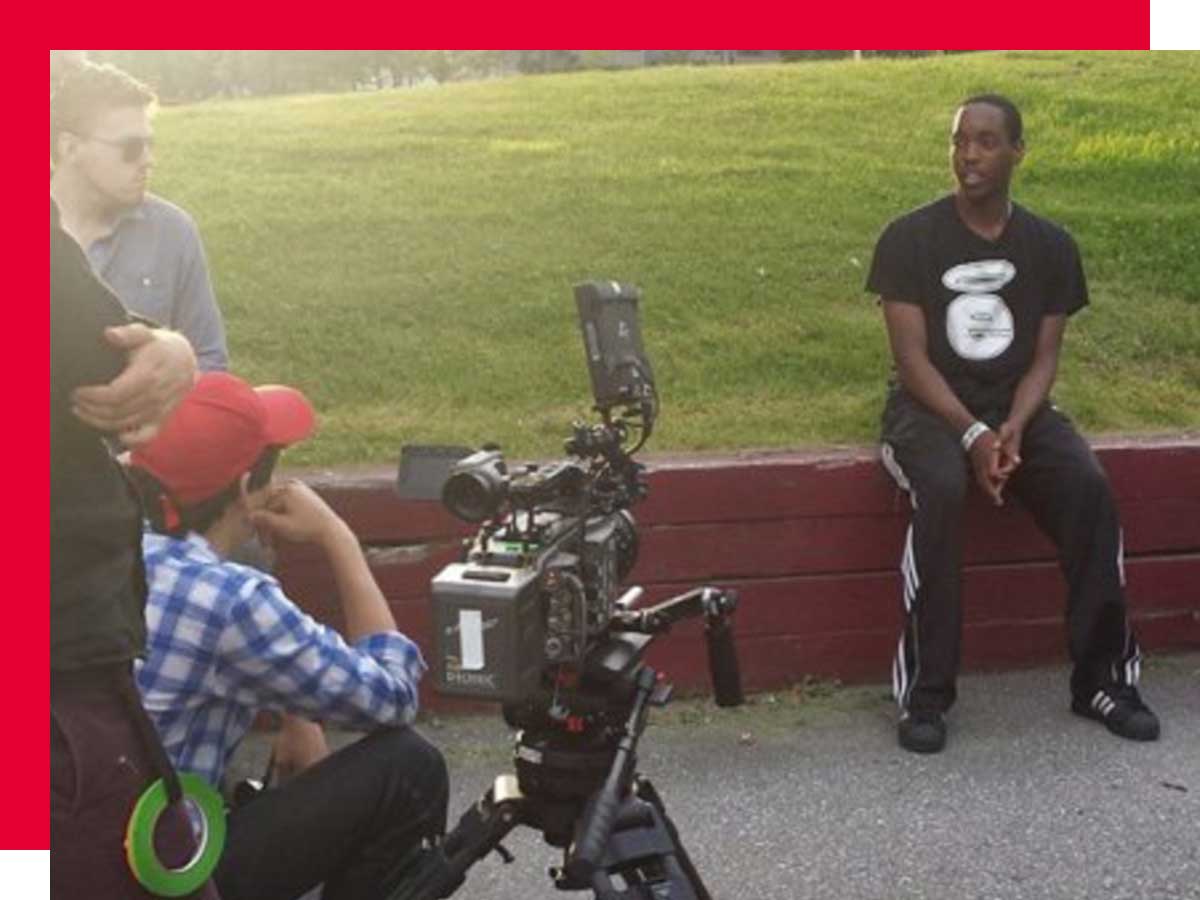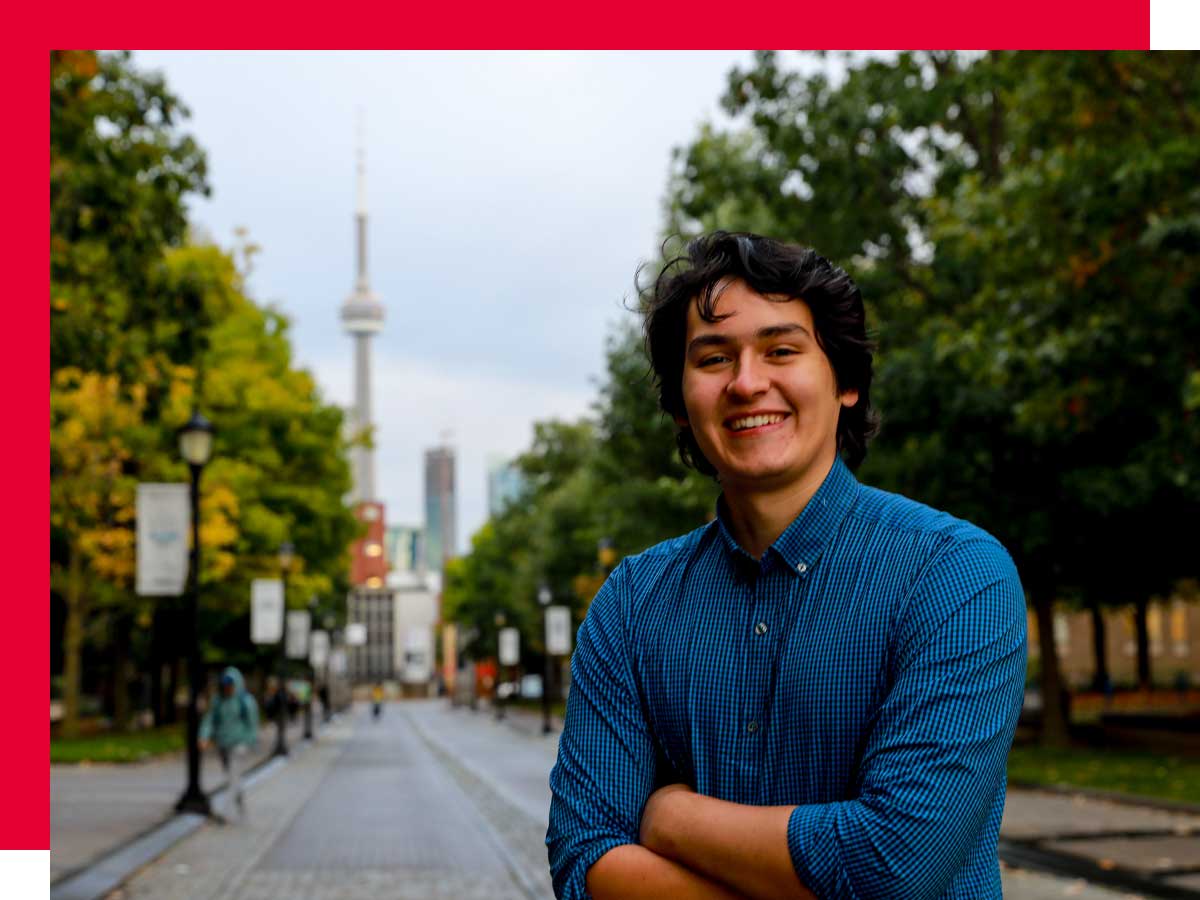Q&A: Award-winning filmmaker dispels stigma around mental health

Luke stands with videographer as they shoot a scene.
Luke Galati, Journalism ’17, has made a name for himself as an award-winning documentary filmmaker and journalist, specializing in basketball and sports. His first film, Eastern (external link) , won Best Documentary Short at the Toronto Short Film Festival in 2016, and also helped fund a scholarship at Toronto Metropolitan University honouring late Rams Men’s basketball alumnus Shae Frattura. He is currently enrolled in our university’s Documentary Media (MFA) program.
His newest short film, When We Reach Out, Who Should Respond?, is more personal. Luke is one of four filmmakers chosen to help dispel stigma, raise awareness and encourage youth struggling with mental health issues to seek support from Stella’s Place (external link) , a Toronto charity that provides free mental health services for young adults ages 16 to 29.
Learn more about Luke and the impact he hopes to make with this new project and his career.

You've achieved a lot already in your award-winning career, what have been your biggest challenges and what are you proud of?
One of my greatest challenges has been overcoming challenges within my own mental health.
In my journey, there have been times when I’ve been low and have had struggles that were difficult to come back from. I’m grateful for my friends and family who have supported me in coming back from adversity and I’m proud that I’m in a great place to create work that is meaningful to me. I believe that I have a lot to give and I’m proud that I was able to come back strong and create an important new film.
What are you enjoying most about the MFA — Documentary Media program and how do you see it elevating your skills and career?
I’d say that for me during my MFA studying Documentary Media, I’ve really enjoyed the process of getting feedback on my film, When We Reach Out, Who Should Respond?
Through this process of receiving feedback from my professors and peers, it’s made my film a stronger work and has pushed me to think differently and critically about the decisions that I make as a director and editor of my own work. Without my classmates, peers and professors mentoring me, this film would not be as strong as it turned out — and in the end I’m really proud of the work that I ended up creating during my graduate studies.
As well, during my graduate studies, I was pushed towards pursuing a subject matter that’s outside of my comfort zone. I decided to make the decision to put myself on camera and tell my own story relating to my mental health journey, which was a new experience for me.
I’m glad that I pushed myself to tell a story that focuses on mental health and shines light on a social issue because I believe it diversifies my experience and shows me another side of what I am capable of.
What inspired your new short film, When We Reach Out, Who Should Respond? Is there a message you hope viewers take from it?
What inspired my film, When We Reach Out, Who Should Respond? was my personal experience of being in a mental health crisis and having the police act as first responders for these situations. I was fortunate, but it made me realize that the way in Toronto and in many other places around the world responds to mental health crises is outdated and unsafe for people experiencing mental health distress.
I wanted to explore what other options should replace police response and I did this during a time when in Toronto, the mental health system was transforming, which I believe made for a unique documentary. As well, I hope that people who have experienced mental health distress see themselves as being represented through this film.
I hope that viewers come out of watching the film with a greater understanding of how long this issue of having what I believe is the wrong group responding to mental health crises. I hope that people come out of watching my film with an understanding of what has been happening in Toronto when it comes to changing how as a society we respond to mental health crises.
Lastly, I hope that people believe that change is possible in creating compassionate care for people who are in need of help.

How have you used creativity and the arts to help navigate challenges you've faced living with bipolar disorder?
Being creative has always been an outlet for me. I believe that the arts have given me a platform to express myself and put myself in positions where I can learn from others. Creating art has been a way for me to create something bigger than myself and to share my perspective and feelings with others. I believe that art created captures a piece of the artist, which is a unique aspect of creating work. Art is something that I believe can change the world for the better and I want to be a voice that can make pieces that have a positive impact on others.
As someone who lives with bipolar, what misconceptions do you feel exist about mental illnesses and how can society better support those living with them?
I’d say that some misconceptions about people who live with mental health challenges is that this group is different from others, when really we are just people at the end of the day and there are more similarities with others than anything else. I think that one thing which is important to me is sharing that as a society we need to focus more on making our world more liveable and a better place for everyone.
This can come on the macro level of political policies which affect us all — especially groups who have been traditionally marginalized like people with disabilities, or on the day-to-day actions of just being kind and caring if you see someone having a tough day. In the end, I believe that we must make our world a better place by caring for our fellow person, no matter the challenges that they face.
A note from Luke
Thank you for taking the time to get to know me. I’m grateful for the opportunity to share my story with you and I hope that others who have struggles with their mental health feel represented and heard through my work and my new film. I’m excited for what comes after graduation, there’s a lot of goals that I want to work towards. In the end, I want to have a positive impact on the world and make a difference.
Find Luke online:
Website: lukegalati.com (external link)
Instagram: @lukegalati (external link)